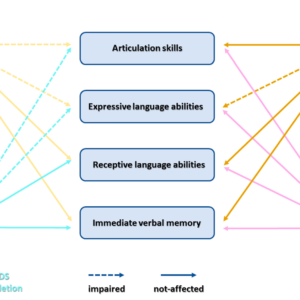We are pleased to announce that our first paper within STREAMLINE Project is now published online in the journal Children (Basel).
22q11.2 deletion syndrome (22q11.2DS), the most frequent microdeletion syndrome in humans, is related to a high risk of developing neurodevelopmental disorders. About 95% of patients with 22q11.2DS have speech and language impairments. Global articulation, story generation, and verbal memory tests were applied to compare articulatory characteristics of speech sounds, spontaneous language abilities, and immediate verbal memory between four groups of Serbian-speaking children: patients with 22q11.2DS, children with clinical presentation of 22q11.2DS that do not have the microdeletion, children with non-syndromic congenital heart defects, and their peers with typical speech–sound development. The obtained results showed that children with this microdeletion have impaired articulation skills and expressive language abilities. However, we did not observe weaker receptive language skills and immediate verbal memory compared to healthy controls. Children with 22q11.2DS should be considered a risk category for the development of speech–sound pathology and expressive language abilities. Since speech intelligibility is an instrument of cognition and adequate peer socialization, and language impairment in school-aged children with 22q11DS might be an indicator of increased risk for later psychotic symptoms, patients with 22q11.2 microdeletion should be included in a program of early stimulation of speech–language development immediately after diagnosis is established.
Read more about our paper on https://www.ncbi.nlm.nih.gov/pmc/articles/PMC11049265/ or https://www.mdpi.com/2227-9067/11/4/489
Congrataliations to authors dr Marijana Rakonjac, dr Goran Čuturilo, dr Nataša Kovačević Grujičić, Ivana Simeunović, Jovana Kostić, dr Milena Stevanović and dr Danijela Drakulić.



